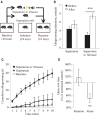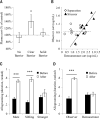Oxytocin-dependent consolation behavior in rodents
- PMID: 26798013
- PMCID: PMC4737486
- DOI: 10.1126/science.aac4785
Oxytocin-dependent consolation behavior in rodents
Abstract
Consolation behavior toward distressed others is common in humans and great apes, yet our ability to explore the biological mechanisms underlying this behavior is limited by its apparent absence in laboratory animals. Here, we provide empirical evidence that a rodent species, the highly social and monogamous prairie vole (Microtus ochrogaster), greatly increases partner-directed grooming toward familiar conspecifics (but not strangers) that have experienced an unobserved stressor, providing social buffering. Prairie voles also match the fear response, anxiety-related behaviors, and corticosterone increase of the stressed cagemate, suggesting an empathy mechanism. Exposure to the stressed cagemate increases activity in the anterior cingulate cortex, and oxytocin receptor antagonist infused into this region abolishes the partner-directed response, showing conserved neural mechanisms between prairie vole and human.
Copyright © 2016, American Association for the Advancement of Science.
Figures




References
-
- Zahn-Waxler C, Radke-Yarrow M, Wagner E, Chapman M. Dev Psychol. 1992;28:126–136.
-
- de Waal FBM, van Roosmalen A. Behav Ecol Sociobiol. 1979;5:55–66.
-
- Palagi E, Cordoni G. Anim Behav. 2009;78:979–986.
-
- Cools AKA, van Hout AJM, Nelissen MHJ. Ethology. 2008;114:53–63.
Publication types
MeSH terms
Substances
Grants and funding
LinkOut - more resources
Full Text Sources
Other Literature Sources

